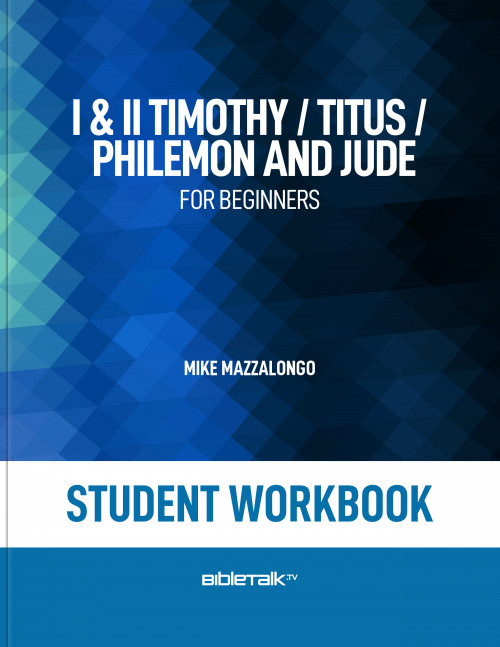Paul's Personal Witness
In verses 1-11 of the opening chapter, Paul sets out to accomplish two important things to help Timothy deal with the issues he faced at Ephesus:
- He establishes Timothy as a legitimate teacher who was teaching sound doctrine. Timothy was a young preacher facing difficult opponents in the church and Paul wanted to strengthen his position by giving him the benefit of his own apostolic approval.
- Paul also condemned the doctrines of the Gnostic philosophers because they strayed from the original teachings of Jesus and the Apostles.
In this way the Apostle drew a "line" in the sand about who was approved as a teacher and which teachings were acceptable. Once done, Paul changes directions and offers a short prayer of thanksgiving before going on to address other matters.
Paul's Prayer of Thanksgiving – I Timothy 1:12-17
Paul gives thanks to God, not only for giving him the ministry of apostleship (which he felt he didn't deserve since he was a persecutor of the church before being converted), but also for enabling him to actually do the difficult work required of a called Apostle. He was grateful to be chosen to serve God, and thankful for having successfully and dynamically done so for many years.
I thank Christ Jesus our Lord, who has strengthened me, because He considered me faithful, putting me into service,
- I Timothy 1:12
Paul's ministry came from Christ who originally called and sustained the Apostle through his many trials. The false teachers were claiming some kind of authority based on their knowledge of secret information. Paul contrasted this by explaining the nature of his relationship and knowledge of Christ who authorized and supported him in ministry. He provides Timothy with this information in the context of a prayer.
13even though I was formerly a blasphemer and a persecutor and a violent aggressor. Yet I was shown mercy because I acted ignorantly in unbelief; 14and the grace of our Lord was more than abundant, with the faith and love which are found in Christ Jesus.
- I Timothy 1:13-14
Paul's main point is that he did not deserve to be an Apostle because of who he was before God called him into ministry. He was a:
- Blasphemer – As a Pharisee he denounced Christ as a fake and a troublemaker.
- Persecutor – He was a persecutor of Christians who tortured and jailed many of them.
- Violent aggressor – He was insolent, aggressive and angry with Jesus and His people.
This is who he was when he met Christ, and why, he says, he was unworthy to be a leader in the church.
Despite all of this, however, God had mercy on him because he did these things in ignorance of Christ. Even though he was ignorant and trying to please God in his own way, he was still sinning.
God showed him mercy by sending someone to preach the gospel to him (not by simply accepting his zeal or sincerity). Sincerity and zeal do not wash away our sins. These are washed away by the blood of Christ in the waters of baptism. We see in Acts 22:16 that Paul obeyed the gospel, reluctantly preached to him by Ananias, a servant of the Lord sent to Paul for this specific purpose.
God's love and mercy was shown to Paul in several ways:
- Christ came to die for his sins.
- God kept him alive to show him the ministry and blessings that would be given to him.
- God gave him the ministry of announcing this good news to the Gentile world.
This grace, offered and received, was sufficient to save him and reset the course of his life (what is unsaid here is that he didn't need secret or special knowledge to gain these things).
It is a trustworthy statement, deserving full acceptance, that Christ Jesus came into the world to save sinners, among whom I am foremost of all.
- I Timothy 1:15
Paul quotes one of the many "sayings" that were circulating in the church at the time. Today we say things like "What would Jesus do? Or, It's a God-thing!" These are phrases that express truths contained in God's word. In the same way, one of the sayings of that time was, "Christ came into the world to save sinners." Paul quotes the saying and confirms it as true when he compares it with his own life. In other words, his life is a prime example of this saying!
Yet for this reason I found mercy, so that in me as the foremost, Jesus Christ might demonstrate His perfect patience as an example for those who would believe in Him for eternal life.
- I Timothy 1:16
Not only is this saying true, and true about him in particular, Paul says that he should be the "poster boy" for this saying so others like him could have confidence in God. The idea is that if God can forgive me, the chief sinner (who tried to destroy both the work and the people of God), then He can forgive anybody.
Now to the King eternal, immortal, invisible, the only God, be honor and glory forever and ever. Amen.
- I Timothy 1:17
Verse 17 is a doxology (spontaneous praise). Here Paul is so overwhelmed with thanksgiving that he breaks into spontaneous praise to God. He says very specific things that we believe God to be:
- God is eternal – without beginning or end (I Timothy 6:16).
- God is immortal – not subject to decay (I Timothy 6:15).
- God is invisible – spiritual (John 4:24; Romans 1:20).
Such a being deserves honor and glory forever. Why? Because no one else is or has done these kinds of things for which they are being honored through praise. Have you never said in your prayers, "Only you, Lord, are worthy of praise!"
Paul's Charge to Timothy – I Timothy 1:18-20
In the last part of this chapter, Paul renews his charge to Timothy.
This command I entrust to you, Timothy, my son, in accordance with the prophecies previously made concerning you, that by them you fight the good fight,
- I Timothy 1:18
The charge or mission originally given to Timothy was based on what the Holy Spirit said about him through the prophets in the church. In the early church those with the gift of prophecy served to guide the church until the New Testament canon was recorded, collected and eventually distributed (Ephesians 4:11-12).
Paul reminds Timothy that since he was chosen in this way he should have confidence to enter into the battle against the false teachers. If God chose him for ministry, God would also be with him in ministry (Matthew 28:20).
keeping faith and a good conscience,
- I Timothy 1:19a
Paul now explains the strategy needed in order to "fight the good fight" in the name of the Lord:
- Keep the faith – Maintain or preserve the faith (the teachings of Christ). Keep preaching and arguing for Christ-centered doctrines. Keep believing these and encourage others to do so as well.
- Keep a good conscience – Faith and moral standards go together. You can't remain faithful or be effective in helping others to remain faithful if your own moral life isn't good. Peter says that we need to "add to our faith moral excellence" (II Peter 1:5). Many times false doctrine or falling away from Christ is preceded by a moral decline.
19bwhich some have rejected and suffered shipwreck in regard to their faith. 20Among these are Hymenaeus and Alexander, whom I have handed over to Satan, so that they will be taught not to blaspheme.
- I Timothy 1:19b-20
Paul gives an example of those in the church who had rejected these principles and ruined their faith as a consequence. He mentions two men, Hymenaeus who is described in II Timothy 2:17 and his brother Alexander (not the blacksmith in II Timothy 4:14).
Paul declares that they were delivered to Satan, which is a figurative way of saying that they were disciplined. We use figurative terms like these today as well:
- "I took a beating on the stock market" doesn't mean that you were physically beaten.
- "My computer crashed" doesn't mean that it actually hit the floor and broke (although, that might be what you'd like to do to it at times).
There are many reasons and ways to "discipline" people in the church. For example:
- Public immorality
- Sin - Incest/fornication - I Corinthians 5:1-5
- Discipline - Withdraw fellowship- I Corinthians 5:2; I Corinthians 5:5
- Heresy / causing division
- Sin - Creating division in the church - Romans 16:17
- Discipline - Withdraw fellowship
- Idleness / gossip
- Sin - People not working (on purpose) and meddling in other's lives - II Thessalonians 3:10-15
- Discipline - Withdraw fellowship
- Disobedience
- Sin - Will not obey the Scriptures or leadership - II Thessalonians 3:6
- Discipline - Withdraw fellowship
- Party spirit
- Sin - Competition for leadership in the church - Titus 3:10
- Discipline - Withdraw fellowship after two warnings
- Personal sin / conflict
- Sin - Personal offense Matthew 18:5-ff
- Discipline - Warn three times/withdraw fellowship
In the case of these two brothers who blasphemed (spoke with disrespect concerning God or sacred things) their core sin was that they promoted false doctrine over the gospel. Being turned over to Satan or being disciplined likely meant that they were withdrawn from or disfellowshipped (two terms used to describe church discipline). To be disfellowshipped means that you cannot enjoy fellowship with other Christians. For example, you are denied the blessing of hearing God's word at the public assembly, sharing communion or participating in other occasions, worship or social interaction with other believers. Jesus said that you are either with Him or with Satan. If, therefore, you are separated from Christians, you are also separated from Christ and thus associated with Satan. There is no third choice.
And so, Paul continues his encouragement of Timothy:
- He encourages him to fight the battle with confidence because he's been called and equipped by God for this struggle. It was important for Timothy to keep this in mind since the ones who had the secret knowledge also assumed that they had a superior intellect.
- He demonstrates that sometimes punishment is necessary for the good of the brethren, and provides examples to show how this should be carried out.
Discussion Questions
- From I Timothy 1:1-11, what does Paul set out to accomplish?
- Explain Paul's reasons for his humility in being selected for his role as an apostle for Christ (I Timothy 1:12-13).
- How is Paul an example of how no matter how zealous we are for service to God, it is not enough?
- Restate I Timothy 1:15-17 in your own words as if you were explaining it to someone.
- What three words does Paul use to describe God and how do they apply to us?
- What does Paul mean when he states to "entrust" in I Timothy 1:18-19 and how does that relate to our role today?
- From the text, discuss some reasons given to "discipline" someone in the church. How does this relate to the teachings of Jesus from Matthew 18:15-20 and I Corinthians 5:1-13?
- How can you use this lesson to grow spiritually and help others come into a relationship with Jesus?






